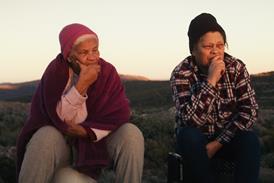Abstracted from Screen International - Part II
To read the previous article, enter: Mike Goodridge into the Screendaily search bar
Pivotal to the symbiotic relationships developing between the US studios and independent production companies lies the purchasing power of TV. "What international broadcasters want is big-budget movies," explains Jay Firestone, chairman and CEO of Canwest Entertainment, whose Los Angeles subsidiary Fireworks Pictures partnered with Paramount on Rat Race and Hardball. "You need TV-friendly feature films because TV is your insurance policy," he says.
"A studio might get $5m out of Germany through a TV output deal, but an independent might pay $6m to get this film to use for its own packaging."
Studios that do frequently sell off rights, such as Paramount Pictures, often do so in order to cover overheads in their domestic releasing operations.
But that still leaves hungry foreign TV output deals, and studios are now trying to hold on to distribution rights in territories where they have profitable distribution centres. "You have to take into account the prerogatives of the US studio," says Gary Levinsohn. "If TV rights start to be a problem for Paramount in Spain, you have to tailor the deal so that Paramount still has TV rights on one or two of its films."
"A year ago, they wanted two territories - now it is five or six," adds Reda. "So we license to them for a lower distribution fee in those territories and cover the territory by estimating what they will gross there."
Indeed, they may sell off foreign rights for more than 50% of the budget, but studios continue to remain proprietary about the film, especially if it was originated and developed by them. "Sometimes the studios treat you as somebody who just buys foreign rights," says Graham King, chief executive of Initial Entertainment Group, who stumped up $67m for Gangs Of New York from Buena Vista and $53m for Ali from Columbia Pictures. "I have to fight for more involvement. I need to make it clear we are not a foreign sales agent. When you are putting up that kind of money, you are not just a sales agent. The studio controls the creative team, so it is not a partnership and can be very frustrating."
King is consequently accessing his own material, housing the production companies of Leonardo DiCaprio (Appian Way) and Catherine Zeta-Jones (Milkwood Films).
Yet, says Levinsohn, these studio development departments are so expert at crafting movies that he readily submits to their processes even with projects originated at Mutual. "Developing these pictures is not easy and requires a lot of effort," he says. "Sherry Lansing has high-paid staff to help her. You need them."
Elie Samaha would agree. The producer and head of Franchise Pictures/Dante Entertainment has financed and delivered a slew of high-profile pictures to Warner Bros in the last two years, but few have been breakout successes and many, such as Driven, the remake of Get Carter and Battlefield Earth have been critically mauled. Now that he has renewed with Warner for another five years, Samaha is working closely with Warner's development department. "The new policy is that we only greenlight movies when Lorenzo Di Bonaventura [president of worldwide production of Warner Bros Pictures], Kevin McCormick [executive vice president] and Alan Horn [president and COO] have approved them. At one point, we were delivering as many pictures as possible, but the only way for us to remain healthy is to work closely with them."
On action film Ecks Vs Sever, for example, says Samaha, production has been delayed to allow for six rewrites. "Lorenzo makes all the creative decisions," he says, adding that he is keen to take on projects originated at the studio. "The studios get better projects than an independent can. It is as simple as that."
Indeed, for all the studios, their need for the Franchises of this world is greater than ever. Gone are the days when studios would offload rejects or films they thought had no international appeal. "Paramount cannot cherry pick their pictures, because if there was never a jackpot won in Vegas, it would not be Vegas," says Levinsohn, who co-financed summer smash Tomb Raider with the studio. "We are an affiliated company to them. We all have to keep one another afloat. They could drown me to keep their heads above water, but it keeps us alive longer if we are both supportive of each other."
Ashok Amritraj, who is partnered with David Hoberman in Hyde Park Entertainment, is sanguine enough to admit that a $100m hit would be beneficial, but says that the star-driven vehicles Hyde Park has so far co-financed such as Bandits, Anti-Trust and Original Sin are "good movies with solid casts and terrific TV value", especially to his chief partner Kirch Media, which pays 35% of the budgets in exchange for rights in continental Europe.
And, he adds: "It is so unpredictable. Studios have got pressure from their parent companies, so they are playing it a little safer. They are sharing the risk, but they are also sharing the upside."
How unpredictable' David Hoberman points to three of the most successful co-financed movies in recent years as examples of movies which their originating studios could not have known would play so well. "I do not think Joe Roth made a wrong decision to co-finance The Sixth Sense," he muses. "You can never know. Do you think Warner Bros knew that Analyze This and The Matrix [co-financed with Village Roadshow] were going to be such big hits'"
Certainly foreign buyers are being more selective after forking out millions for the likes of Isn't She Great, Meet The Deedles and Flawless in the past. "The euphoria of having studio movies in the independent marketplace has worn off," says Joe Drake, president of Senator International. "Buyers are doing their homework on anything they are offered. They are very diligent about who is directing, who is in it and if it will work in their territory. International buyers are paying a lot of attention to studio movies but it is not a guaranteed sale."
Indeed, during the fiscal madness of the German Neuer Markt, the studios became accustomed to getting up to 70% from foreign partners. Daniel Diamond, president of Fireworks Pictures, recalls bidding 62.5% of the budget for international rights to one studio film, assuming that he would go to 65% if necessary. "Somebody outbid us by offering 70%," he says.
Diamond recently hired Julia Roberts' old production partner, Pliny Porter, to spearhead a renewed production push as a way of originating material and not be forced to overpay for studio movies.
Joe Drake at Senator International is doing the same, having successfully sold the $40m drama 24 Hours - which originated from Senator's recently dissolved partnership with The Canton Co - to Columbia Pictures in North America and numerous territories. "You have to add value to the model," he says. "In the past, people made money out of the information they had about the foreign market and others in Hollywood did not. Now the studios know about territorial buyers and vice versa. Everything is transparent."
"The business used to revolve around standard deals," adds Penny Karlin, a distributors representative with Karlin/Green Media, who acts as an intermediary between the producer/seller and foreign buyers. "Now you can do any kind of deal. It is the Wild West."


















No comments yet